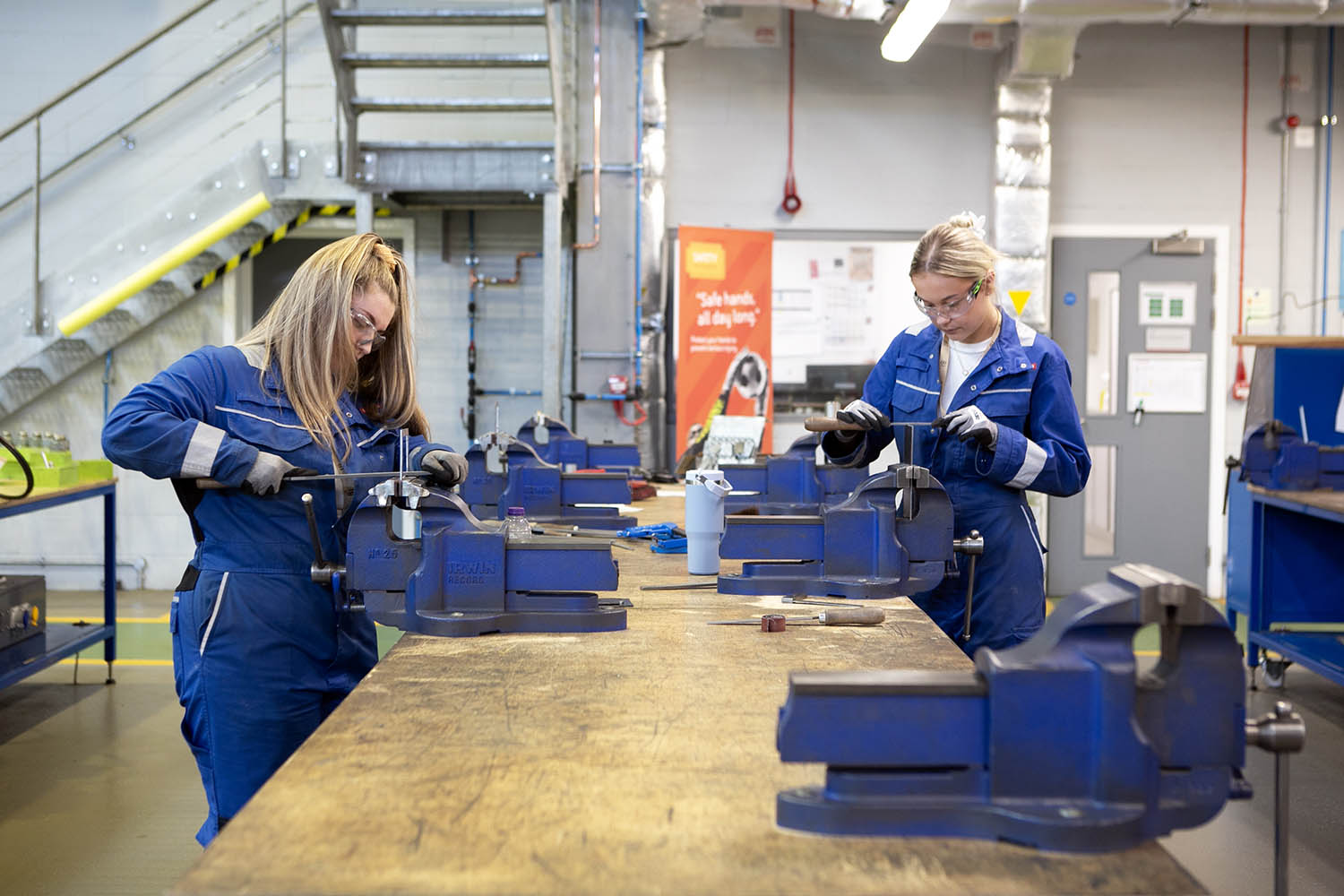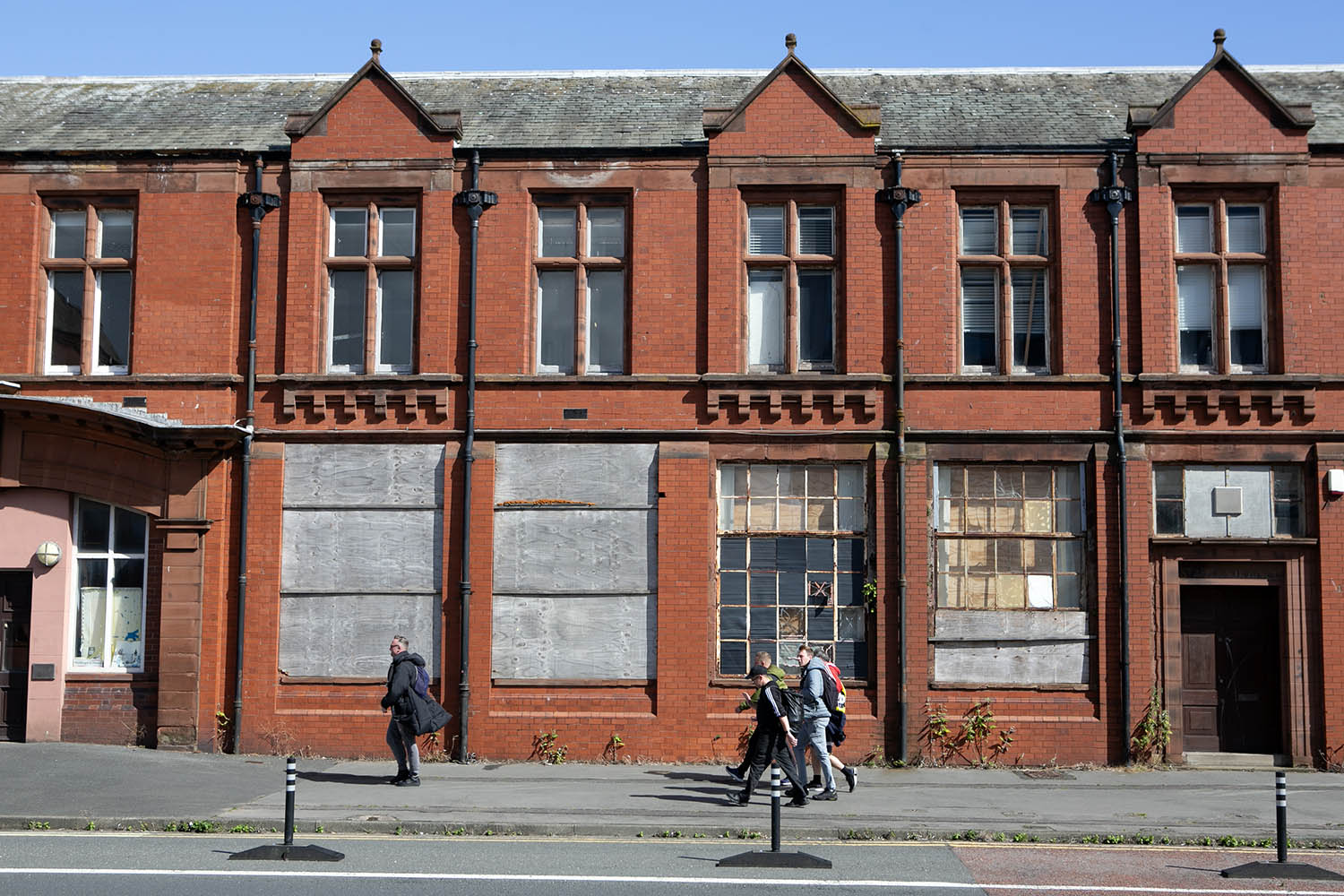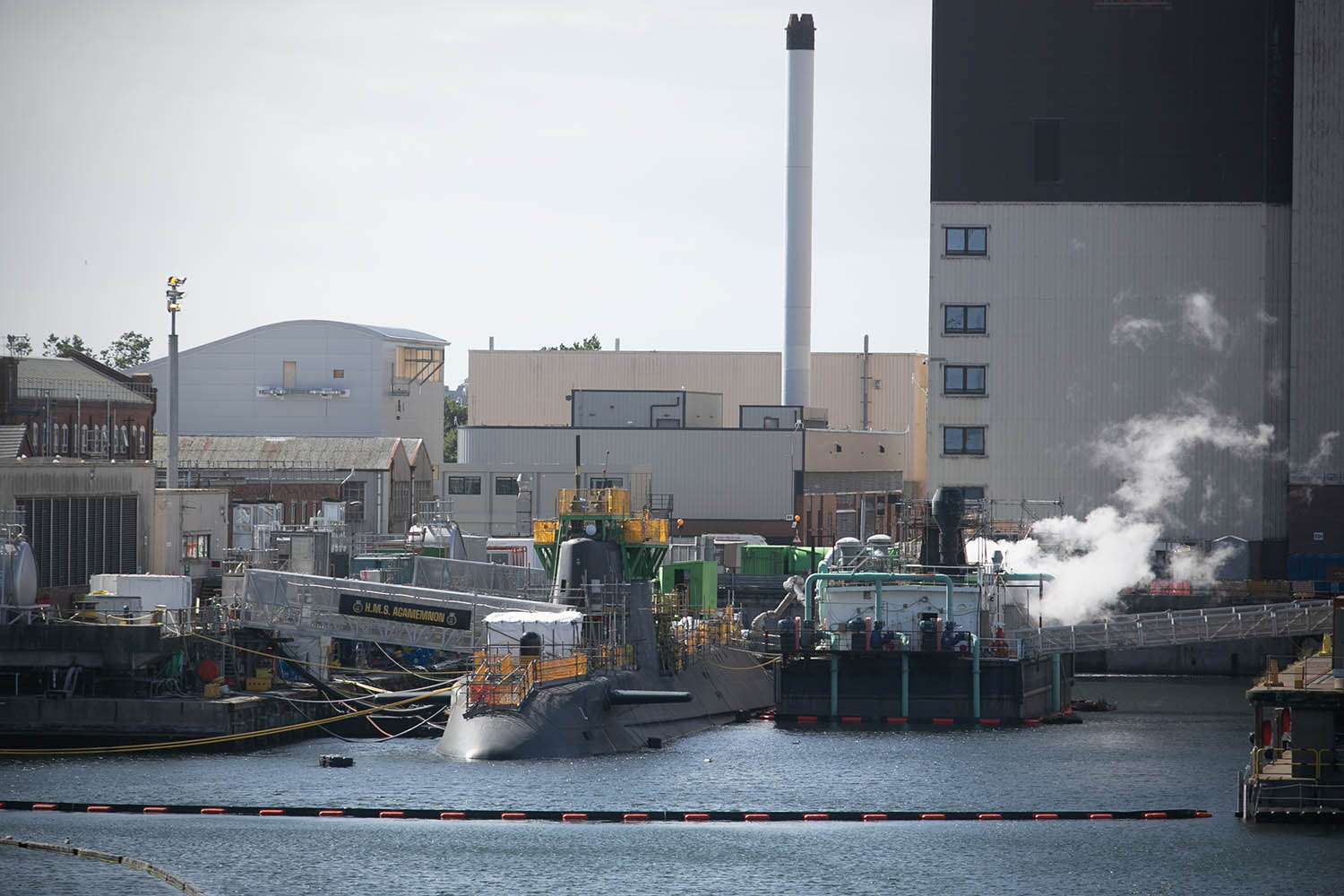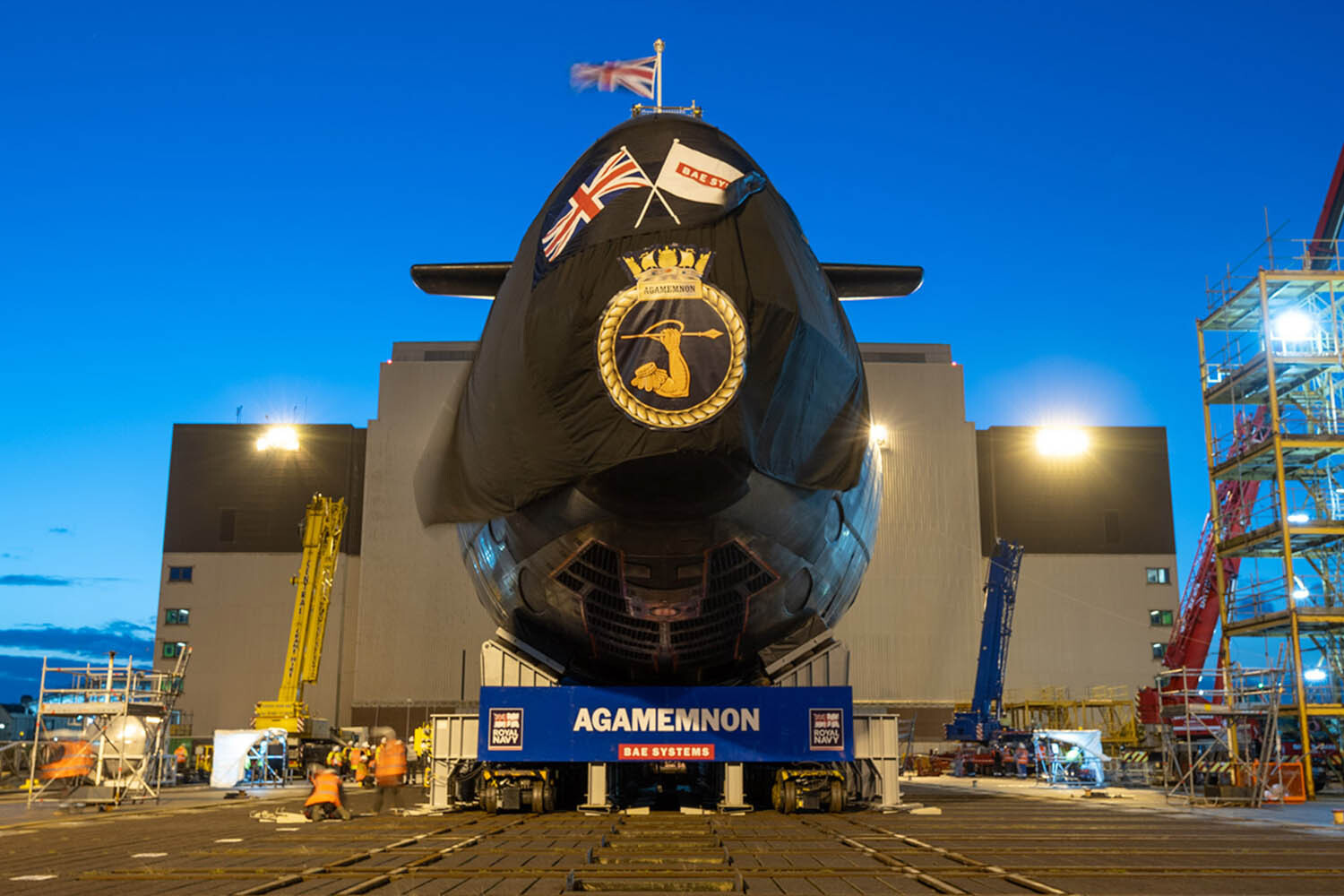Photographs Richard Saker
In the dock at Barrow-in-Furness, the nuclear-powered submarine rises out of the water like a giant blue whale. Its curved back and blunt conning tower are just visible but most of its vast metal body is submerged. This is Agamemnon, the sixth of seven Astute-class attack boats that have been built by BAE Systems in the Cumbrian town. It was named not with the traditional bottle of champagne but with a keg of locally-brewed beer smashed against its side.
The shipyard dominates Barrow like the submarine dominates the dock. A third of the working age population here is employed by BAE Systems. When a new vessel is launched, the whole town comes out to celebrate and schoolchildren line the streets waving flags. David, 36, who is employed in the shipyard, says there is a “sense of awe” when workers see a finished submarine for the first time. He says: “It’s almost as if this thing has come from nowhere. You think your own little bit is insignificant but it’s been everyone working together. It’s like an ant colony.”
He says Barrow feels proud to be making such a critical contribution to the nation’s defences.
“We see the news, we see the volatile state the world is in and the need for this. We do things to help people stay safe in their beds at night,” he says. “Shipbuilding is in our blood. It’s part and parcel of being a Barrovian. I’d say about 60% of the people who live on my street work in the yard. I’ve got two girls, aged 6 and 10, and hopefully they’ll go into the shipyard eventually.”
With Keir Starmer promising to spend 5% of GDP on defence and security by 2035, Barrow will be one of the main beneficiaries of the increase in military expenditure. Inside the cathedral-sized Devonshire Dock Hall, four Dreadnought submarines that will carry Britain’s Trident nuclear weapons are being built under the highest security. Each is more than 150 metres long, weighs 17,200 tonnes and will have a crew of 130 men and women committed to maintaining the continuous at-sea deterrent. The shipyard will also construct up to 12 conventionally-armed nuclear-powered submarines for the Royal Navy, as well as contributing to the Aukus programme, the joint endeavour between Australia, the US and the UK. The scale and length of these contracts mean jobs are guaranteed for the next 60 years.
Last year the Ministry of Defence spent £28.8bn with UK companies including BAE Systems – a real terms increase of £2.2bn on the previous year. As the budgets continue to rise, ministers want to ensure that the money feeds through to generate employment and boost prosperity in some of the poorest parts of the country. Barrow is the blueprint for what the government is calling its defence industrial strategy.
About 15,500 people work in the shipyard and Janet Garner, future workforce director for BAE Systems, says this will rise to 17,000 over the next decade. There are 60 types of apprenticeship ranging from welding to nuclear engineer. Last year, 900 young people were taken on as trainees, 70% of them from Barrow.
“Our approach is very much where we can recruit locally we absolutely will,” Garner says. “We can’t afford to have a transient workforce coming in and out.”
Newsletters
Choose the newsletters you want to receive
View more
For information about how The Observer protects your data, read our Privacy Policy

Apprentices at BAE Systems Academy for Skills and Knowledge (SASK) in Barrow-in-Furness in Cumbria, England
She describes a symbiotic relationship between the company and the town, saying: “There’s a commercial driver but also having 30% of the workforce we absolutely recognise the obligation we’ve got to the community we operate in. Our business strategy will be very difficult to deliver unless we pay attention to the attractiveness of the town. Our ability to get people to settle here is critical.”
This is a long-term endeavour, she insists. BAE Systems sends engineers into schools to encourage pupils to take the subjects they need to work at the shipyard. Fairytales have been rewritten to put an emphasis on science, technology, engineering and maths. Instead of lowering her hair for the prince, Rapunzel builds a winch. The company is also setting up a training facility in Barrow town centre, in the old Debenhams building. There will be no cafe in a deliberate attempt to increase footfall on the high street.
Brad Greve, chief financial officer of BAE Systems, says the firm has taken a hard-headed decision to spend £1bn on education around the UK
“If we don’t invest in those programmes we won’t have the people to support the growth that we see coming. It’s not an altruistic motivation, it’s to support our business,” he says. “If we are helping reinvigorate the community, repurposing boarded up shops, it’s going to lead to a more productive workforce.”
A few years ago, Barrow was identified by the Office for National Statistics as the ‘unhappiest place’ in the UK
A few years ago, Barrow was identified by the Office for National Statistics as the ‘unhappiest place’ in the UK
There are few places that need the support more than Barrow. The town has some of the worst health and education outcomes in the country. Despite the billions pouring into the shipyard, one in five people live in poverty, and a similar proportion report struggling to feed themselves and their families. In some parliamentary wards, half of the children are growing up in poverty. Almost a quarter of the population are long-term sick, nearly one in ten young people are unemployed, and more than two thirds of adults are overweight or obese. Barrow has some of the highest male suicide rates and alcohol-related admissions for under-18s. A few years ago, it was identified by the Office for National Statistics as the “unhappiest place” in the UK. On Barrow Island, not far from the dock, male life expectancy is 71 years, similar to Belize.
Frank Cassidy, 67, a local Labour councillor who has lived in the town all his life, says: “There are two Barrows. At Christmas time there are the people looking forward to it with two cars in the drive and the ability to buy their children lots of presents, and there are those living in the tenement blocks who don’t know how they are going to afford to eat.”
The town is just an hour by car from the Lake District, surrounded by beautiful beaches, with a seal colony on its shores, but it is hard to reach, at the end of a peninsula sticking out into the Irish sea. Its magnificent Victorian red brick town hall and haunting 12th century Furness Abbey are reminders of a more prosperous past. The town once had the largest iron and steel plant in the world. Its shipyard built the Royal Navy’s first submarine, HMS Holland, in 1902 and in the second world war the town was such a crucial contributor to the military campaign that it became one of the Luftwaffe’s top targets.

The port town of Barrow-in-Furness in Cumbria, England. The town faces significant poverty challenges, with some areas ranking as among the most deprived in England
At the end of the cold war, however, the defence contracts dried up and 10,000 jobs evaporated. Money and people left the town. Many buildings are still derelict and shops boarded up. There used to be 108 pubs in the town, now there are 46.
Larry Hunt, 75, the landlord of the Cross Keys, says the heavy reliance on one large employer is a double-edged sword. “Without the shipyard we wouldn’t have Barrow but we have problems recruiting staff. At BAE you’ve got lads cleaning who are being paid more than they would get for bar work doing unsociable hours. We had to reduce our number of staff so we could match the pay.”
The appeal of Reform UK is growing in what has traditionally been a Labour constituency. Although the number of immigrants is very low, there have been protests against plans for a Muslim prayer room for doctors at the local hospital. Hunt says people have lost faith in the mainstream political parties. “I don’t think the politicians are thinking about us, that’s for sure,” he says. “A lot of the young ones that come in here are all for Nigel Farage. They’re fed up with the same old same old. People have been lied to for too long and they’ve had enough. The world’s changing so rapidly and I don’t think it’s for the good. We’re not in control.”
The paradox is that Barrow is still suffering from the consequences of de-industrialisation at the same time as it is being re-industrialised again. There are parallels with the former mining communities in the north of England, but Michelle Scrogham, who was elected Labour MP for Barrow and Furness last year, believes there is a crucial difference with the old pit villages. Mining was brutal, dangerous and unrelenting work. By contrast, she says: “There are so many trades and skills at the shipyard. You could be a shipwright, you could be in calibration, you could be in there training as a welder. As long as we don’t have the peaks and troughs it’s absolutely brilliant. We’ve got really well paid, highly skilled jobs.”
Simon Case, the former cabinet secretary, is chair of Team Barrow, a partnership between central Government, Westmorland and Furness Council and BAE Systems which has been given £200m of taxpayers’ money to regenerate the town. He says the treatment of Barrow has been “shameful” over many generations. When he was running the civil service he used to force permanent secretaries across Whitehall to visit the town to witness for themselves the disintegration of a community.
“It’s immensely bitter that thousands of people got laid off from the yard and what used to be a very prosperous town has been suffering incredibly from the decline in investment. And yet here’s another moment in our history when the nation comes knocking on Barrow’s door and says ‘hey can you deliver not only for the UK but for our partners in Australia?’ And you look around Barrow and you say ‘where were you guys for the last 30 years?’ I think there is a moral imperative for us as a nation to ensure that the investment in defence finds its way into the pockets of workers in places like Barrow.”

A HMS Agamemnon Astute class nuclear attack submarine docked in Barrow-in-Furness
John Healey, the defence secretary, agrees that the boost in military spending must be an “engine of growth” as well as a bonus for national security.
“We’re increasing defence investment to respond to this new era of threats but it isn’t just about reinforcing and building up our armed forces, it’s about reinforcing and building up our industrial base, our innovation base and boosting jobs right across the UK,” he says. “When you look at the Dreadnought programme, there are set to be 30,000 jobs in 6,000 companies in the supply chain across the UK. You start to get a sense of the scale and the reach. Defence investment is supporting well over 400,000 jobs right across the UK already, and 70% of those jobs are outside London and the south east.”
Some of Labour’s left-wing MPs are not happy, but Healey is unapologetic. He says: “We’re in an increasingly dangerous and uncertain world; first and foremost people expect the government to defend the country and keep them safe. These are investments of national importance and are essential to all of us for the future. We’re starting to change the mindset. People are seeing there’s a good argument for saying the country’s security is a good investment, it’s a sound investment, it’s an ethical investment, it’s the right thing to do.”
Iain Overton, executive director of Action on Armed Violence, points out that the increase in defence funding has been funded by a cut in the aid budget. He says: “It is not just a matter of economic regeneration in places like Barrow. The billions being funnelled into arms and military tech suggest that our national identity is being rebuilt not around humanitarian leadership or diplomatic clout, but around the machinery of war. We are becoming a country that subsidises BAE’s shareholders while cutting programmes that once protected the world’s most vulnerable.”
The apprentices at the Submarines Academy for Skills and Knowledge in Barrow have little time for politics.
Robbie, 28, is training as an electrician – the wires and circuit boards he learns on are positioned above his head, as they are on a submarine. Before joining BAE Systems he was a musician, but after starting a family he wanted more stability. “I knew it would future-proof myself. This is a skill for life,” he says.
Brogan, 29, was a dance teacher before signing up to train as a pipe fitter at the shipyard. “It’s inspiring going on to the boats. You hear about it from living around here, but to see it is something quite special. A lot of people who work here have pride in the job that they do. The boats are there to protect the country.”
Nhiam, 24, is studying for a degree apprenticeship in nuclear engineering. He says: “We watch the news. I do believe that what we do matters.”
Next month Cumbria University will open a new campus right next to the shipyard. The courses have been developed in collaboration with BAE Systems. Scholarships will be offered to students who sign up for mechanical engineering or computer science courses and there will be summer work placements in the yard. The vice chancellor, Julie Mennell hopes it will be part of the town’s rebirth.
“Barrow has one of the lowest higher-education participation rates in the country. A very strong statement is being made to young people in the area – this is here for you,” she says. “Over many years, the town has had times of decline. It’s now in a position where it’s got certainty. It’s got the ability to invest in people and place. Barrow will rise up from the ashes like a phoenix.”

